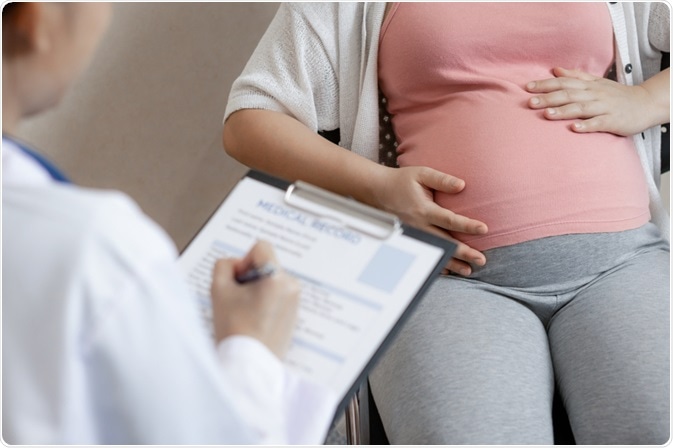Women with renal disease, which is also known as kidney disease, are at a significantly increased risk of complications during pregnancy, despite advances in healthcare to reduce these outcomes.
The incidence of renal disease in pregnant women is relatively low, with approximately 0.03% of pregnant women who have been diagnosed with the disease prior to conceiving. However, the potential effects are alarming and, as a result, this is a topic that needs to be closely considered.

Image Credit: Blue Planet Studio / Shutterstock.com
Stage of kidney disease
The stage of kidney disease in the pregnant woman will have an effect on the expected outcomes; therefore, those with more severe disease are more likely to experience complications. The stage of the disease is classified by the glomerular filtration rate (GFR).
- Stage 1 involves kidney damage with normal or raised GFR, greater than 90.
- Stage 2 involves kidney damage with mildly low GFR between 60 and 89.
- Stage 3 is characterized by moderately low GFR between 30 and 59.
- Stage 4 is characterized by severely low GFR between 15 and 29.
- Stage 5 is referred to as kidney failure with GFR less than 15 and the need for dialysis.
Renal function in pregnancy
During pregnancy, the glomerular filtration rate normally increases to up to 150% of the normal rate, peaking at approximately the 13th week of pregnancy. During this time, the levels of urea and creatinine decrease as a result of the increased renal excretion.
Changes in hormone levels such as progesterone during pregnancy can also have an effect on renal function, due to the relaxation of smooth muscles in the body. Additionally, the tubular function can reduce the reabsorption of glucose, leading to glycosuria.
Effects on pregnancy
There are several areas that can be negatively affected in pregnancy if the mother has renal disease. These include pre-term delivery, fetal growth, preeclampsia, and perinatal deaths. The incidence of these effects depends on the stage of renal disease, with complications occurring less commonly in earlier stages of the disease.
The prognosis for infants with mothers who are on dialysis while pregnant is particularly alarming. The majority of associated pregnancies are affected by restricted fetal growth and pre-term birth. In fact, only about 75% of infants survive if the mother was on dialysis during the pregnancy. The survival rate is even lower, with approximately 50% infant survival if the mother was on dialysis at the time of conception.
Effects on renal function
There can also be a loss of renal function linked to pregnancy that occurs during the pregnancy or continues after postpartum. Approximately half of those with moderate to severe renal disease experience a 25% loss of renal function during pregnancy, with the majority of these effects continuing postpartum.
Can you have a baby if you have chronic kidney disease (CKD)?
Pregnant women with renal disease
Women with renal disease who are thinking to become pregnant and start a family should have access to health specialists to help guide them through this process. It is important that women with renal disease are aware of potential risks and the ways in which they can reduce complications and improve the prognosis for their child.
Most women with mildly decreased renal function before conceiving have a normal pregnancy without adverse effects, although there is a slightly increased risk of complications. Those with more advanced disease are at an increased risk of complications for their baby and some, particularly for those patients on dialysis, may be fatal for the infant.
The decision to start a family and try to conceive depends on each situation. Some women prefer not to become pregnant to avoid the risk of complications associated with the condition, whereas others prefer to try. For this reason, it is important that counseling is provided so that these women have access to reliable information to help them make the decision.
References
Further Reading
Last Updated: May 23, 2021